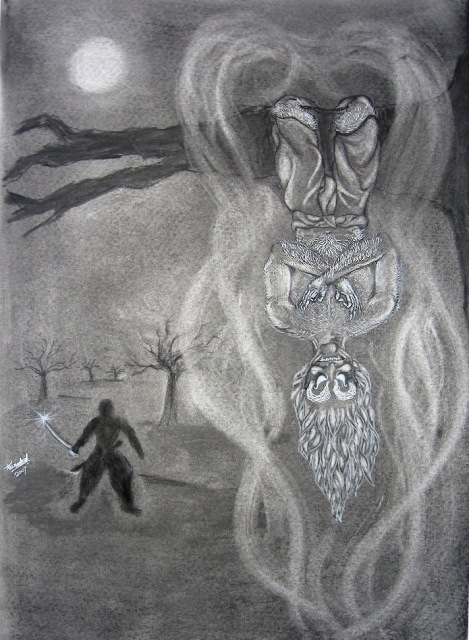These notes come from R. K. Narayan's The Ramayana, of which I have acquired a physical copy
Although I think an epic should not be all about battles, if a battle should take place in the story, then the battle should take place in the writing! I felt it was simply silly that the scene of Rama dispatching an entire army of demons was given only four sentences of content. If I choose to do a writing from part B, I would choose to review this battle in some way.
In this section of Rama living in exile, Soorpanaka, who is Ravana's sister, has fallen in love with Rama, but in stalking sita has had her nose, ears, and breasts cut off by Lakshmana. She retreats to the demon encampment, where her stepbrother, Kara, is commanding a demon army and 12 powerful demon lieutenants. Soorpanaka commands him to get revenge, although she ultimately wants Rama for herself. Kara sends his 12 lieutenants and Soorpanaka. Soorpanaka points to Rama and tells the 12 to keep him alive. Rama defeated them easily. Soorpanaka fled and talked to Kara again, who blew his tocsin to gather his entire army. They surrounded the jungle cottage, started screaming madly to scare their victims, they clanged their weapons and wove them about in the air. "The result was the same as before," was the only other description given. Soorpanaka watched from afar and fled to her brother once the battle was lost.
I think this story should portray a much more brutal battleground. In my view, an army of demons do not simply sneak up and surround a small hut in the jungle. I imagine the demon army would look like this, and the surrounding landscape would look similar.
Image Information
In this section of Rama living in exile, Soorpanaka, who is Ravana's sister, has fallen in love with Rama, but in stalking sita has had her nose, ears, and breasts cut off by Lakshmana. She retreats to the demon encampment, where her stepbrother, Kara, is commanding a demon army and 12 powerful demon lieutenants. Soorpanaka commands him to get revenge, although she ultimately wants Rama for herself. Kara sends his 12 lieutenants and Soorpanaka. Soorpanaka points to Rama and tells the 12 to keep him alive. Rama defeated them easily. Soorpanaka fled and talked to Kara again, who blew his tocsin to gather his entire army. They surrounded the jungle cottage, started screaming madly to scare their victims, they clanged their weapons and wove them about in the air. "The result was the same as before," was the only other description given. Soorpanaka watched from afar and fled to her brother once the battle was lost.
I think this story should portray a much more brutal battleground. In my view, an army of demons do not simply sneak up and surround a small hut in the jungle. I imagine the demon army would look like this, and the surrounding landscape would look similar.
(Demon Army - unfortunately, I couldn't find an original artist, but I found the image being used similarly here)




